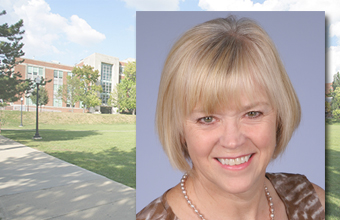College of Arts and Sciences Newsroom

Spirit of Schuellein
Hannah V. Carey, a comparative physiologist who has served in leadership roles at the American Physiological Society and National Science Foundation, will visit the University of Dayton this week to deliver the first Schuellein Lecture in the Biological Sciences. She also will discuss how the University can leverage its research strengths to obtain greater national funding for student training.
Carey will give her lecture, “Seasonal Remodeling of the Host-Microbe Symbiosis in Hibernation,” at 4 p.m. Thursday, Oct. 27, in Science Center 114. It will be immediately followed by a reception in the Science Center pre-function space.
The Schuellein Lecture and related workshop, “Developing Tomorrow’s Innovators: Federal Support for Interdisciplinary Training,” are sponsored by the Schuellein Chair in the Biological Sciences. The endowed chair, currently held by professor Carissa Krane, recognizes outstanding accomplishments and contributions of a faculty member in the department of biology.
The Schuellein Chair was created through gifts totaling $2.5 million from the estate of Robert J. Schuellein ’44 — a Marianist brother, alumnus and former professor who helped establish the graduate program in biology before leaving the University in 1964 to join the National Institutes of Health. Schuellein oversaw NIH research grant administration and training programs until his retirement in 1983. He died in 2011 at age 91.
“Dr. Schuellein was a well-known researcher; he contributed to science, but he also had this passion for advancing student-mentor relationships, and helping students and faculty mentors find funding through the NIH to support their training,” Krane said. “I think Dr. Carey embodies the spirit of what Dr. Schuellein did here at the University and in his time at the NIH.”
Carey is a professor in the department of comparative biosciences at the University of Wisconsin School of Veterinary Medicine and director of the UW-Madison Biotron Laboratory.
Her research program studies mammals that hibernate, examining how they adapt to extreme changes in physiology and nutrition, and translating hibernation biology to biomedicine for application in areas such as organ preservation, severe blood loss, and tissue damage caused when blood supply returns after a period of ischemia or lack of oxygen. Carey's research has been funded by the NIH, NSF, the U.S. Army Research Office and the Defense Advanced Research Projects Agency.
Carey earned her doctorate in zoology from the University of California-Davis and did postdoctoral training at the University of Nevada School of Medicine and the Ohio State University College of Medicine.
Currently, Carey is on the board of directors of the Federation of American Societies for Experimental Biology and is vice president-elect for science policy. She also is a member of the Biology Directorate advisory committee at the National Science Foundation, where she served as a rotating program director from 2010-2011, working in the Division of Integrative Organismal Systems.
In addition, she served as American Physiological Society president from 2007-2008, and was the 2014 recipient of the August Krogh Distinguished Lectureship Award from the Comparative and Evolutionary Physiology Section of the APS, the organization’s highest honor.
“There is so much synergy between what she does in terms of her excellence in science and her commitment to administration, public policy and student training — very similar to what Dr. Schuellein did,” Krane said. “She’s a fantastic scientist, she’s held leadership positions and she has this sense of service, which is very Marianist. She’s served in all capacities in professional societies and she feels this very strong desire to pay it forward for the next generation of scientists, so I think she is the perfect person to hold the inaugural Schuellein lecturer position.”
On Friday, Oct. 28, Carey will facilitate the workshop about opportunities at the NSF to fund undergraduate and graduate students through emerging models of interdisciplinary proposals. That event is from 8:30-10:30 a.m. at River Campus, 1700 S. Patterson Blvd., in room M2265. Please RSVP to Carissa Krane at ckrane1@udayton.edu if you plan to attend the workshop.
- Dave Larsen, communication coordinator, College of Arts and Sciences
